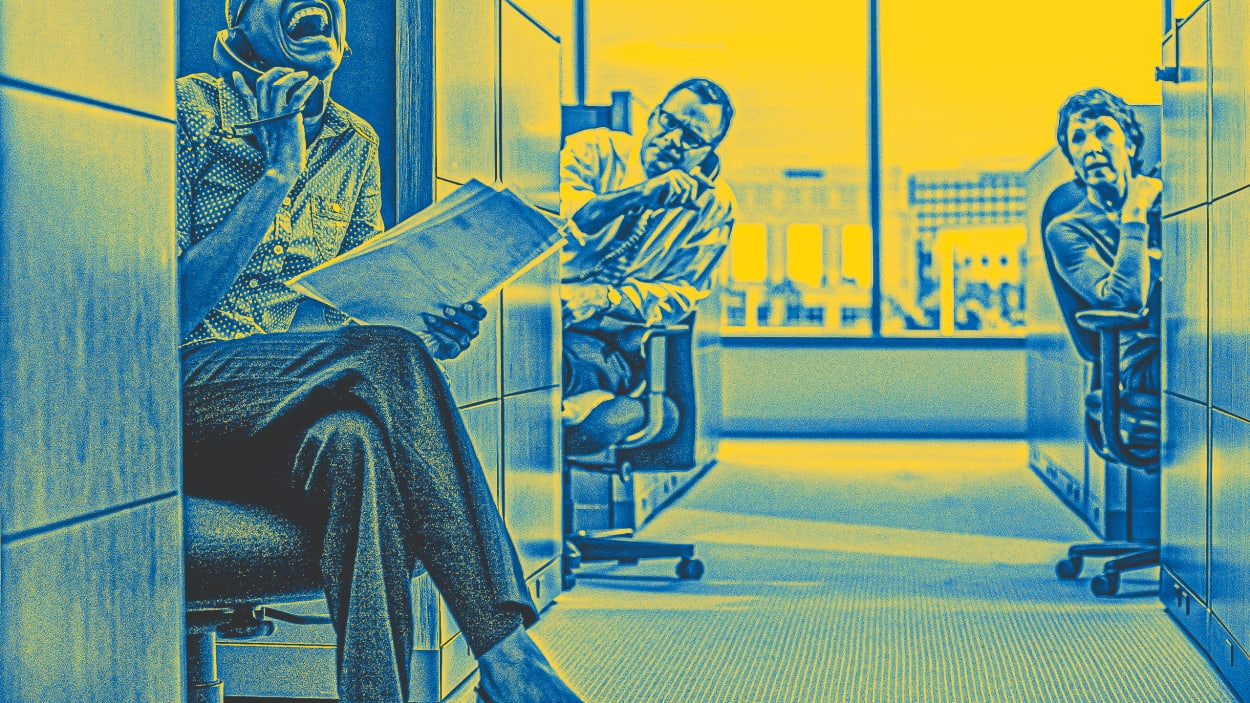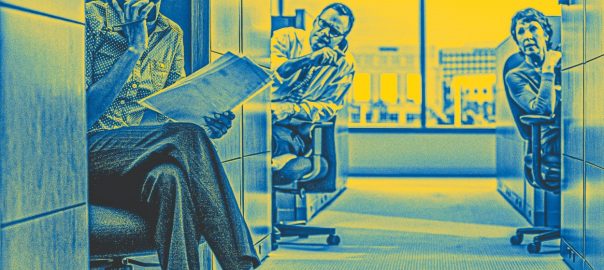By Jennifer Alsever
Walk into a Bishops Salon in Denver, Tampa, or San Francisco, and you’ll experience a cacophony of sound: vacuum cleaners, hair dryers, thumping music, running water, clanging of spoons and bowls, and conversation—lots of conversations among the 35 to 45 clients who sit for appointments each day.
In the past two years, some customers have indicated they’re over it and don’t want to talk, talk, talk—and Bishops CEO Leigh Feldman got the message loud and clear. Late last year, the chain rolled out the option to make a “silent appointment” at its 42 nationwide locations, cuing stylists to cut the chit-chat. And while most hairstylists tend to be social, Feldman says some of them actually enjoy the break in conversation at work.
“A lot of people just want to escape this conversational madness and have quiet,” Feldman.
The world is a noisy place, and it’s getting louder. At the same time, people may be less tolerant of noise in the post-pandemic work world. As employees head back to the office, 52% of office workers say they are concerned that noise levels in the office will make them less productive, according to a recent survey by HR Magazine. Nearly two-thirds of those people say they fear they’ll get fed up if their noisy coworkers break their concentration, and 42% worry that they’ll slip into “noise rage” if colleagues become too loud.
“We’re all revving really high right now—and we’re sensitive,” says Jennifer Moss, a journalist and author of the book The Burnout Epidemic. “There’s a mental fatigue that happens by hearing all these noises all day long. It can actually increase the likelihood of anxiety and depression over time.”
A problem that speaks volumes
No doubt, we’re inundated with information and sound every day, whether it’s the nonstop meetings, ringtones, notifications, keyboard clacking, blaring fire engines, or honking cars. And the world is getting louder: As noise of traffic and street activity has gotten louder, the volume of emergency sirens in some cities has grown to 120 decibels in the past two decades. Noises of 140 decibels are considered hazardous to our health and 85 decibels can jeopardize our hearing.
All that noise can make us lose concentration, motivation, and brain functioning: People lose an estimated 86 minutes of productivity each day because of noise distractions, according to a study by Steelcase. It takes another 23 minutes to get back on task after an interruption, according to another University of California at Irvine study.
Noise is also bad for your health. It is connected to heart problems, loss of sleep, high blood pressure, and higher levels of stress. Noise can trigger the amygdala—the fight-or-flight area of the brain—and as a result, adrenaline and stress hormones flood the body. Meanwhile, the World Health Organization has concluded that excessive noise was the root cause of 3,000 heart disease deaths among Europeans.
A study by German researchers found people who lived in neighborhoods with more traffic noise had a higher incidence of depression. Another study found that a 10-decibel increase in noise from aircraft at seven different European airports led to a 28% jump in the use of anxiety medication.
Noise feels different in the post-pandemic work world. Pre-COVID, an office might have some 200 people in cubicles during the day. Today, with hybrid work, that number might be 40 or 50 at a time, says Benjamin Sachwald, director of acoustics, noise and vibration practice at AKRF, a New York environmental engineering, planning, and consulting firm.
The louder din of more people actually made it easier to ignore those noisy distracting sounds: the rattle of the elevator or that colleague who’s slurping ramen and talking on his cell phone to his mother. Offices are busier, with people coming and going and designed for the social collaboration you can’t find at home.
Sensitivity to noise varies among people. Introverts, for instance, tend to tolerate much less noise than extroverts, according to Susan Cain’s book Quiet: The Power of Introverts in a World that Can’t Stop Talking. She writes of one study in which extroverts chose 72 decibels for the “just right” level of sound, while introverts chose 55 decibels. Those introverts also performed much worse on tasks when exposed to the extrovert’s noise levels.

“The absolute superpower skill right now for leaders is empathy,” says Moss. “For some, going back to the office is really nerve-wracking. It’s about giving people a lot of room and space and compassion.”
Solutions for a noisy world
To improve acoustics, companies are installing modular phone booths for quiet work and building huddle rooms with soundproofing that allows everyone in virtual meetings—both at home and in the office—to hear more clearly. Companies are also turning to “soundscaping.” One UK soundscaping company, Moodsonic, does this by playing a wide range of nature sounds, from the babble of a stream to island forests, inside client offices and thereby silencing noisy conversations or a surge in activity. The company’s software uses sensors to monitor areas of offices and automatically adjust the sounds, says Evan Benway, managing director of Moodsonic.
If that doesn’t provide enough silence, you can always step inside PinDrop, a 650-square-foot office space in the heart of Manhattan. AKRF designed the space to be uber quiet by building a “floating room within a room,” with isolation blocks, insulation, springs, and layers of sheetrock.
As a result, it blocks out all of New York City: the roaring subway, the shouts, the honks, the elevator, the hum of the HVAC system, and more. The soundlessness stuns many people who enter, especially New Yorkers, says Sachwald. “It takes a minute or two for their ears to adjust,” he says. “They can’t believe how quiet it is.”
Depending on who you are, that may be music to your ears.
(28)





